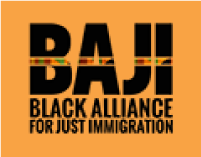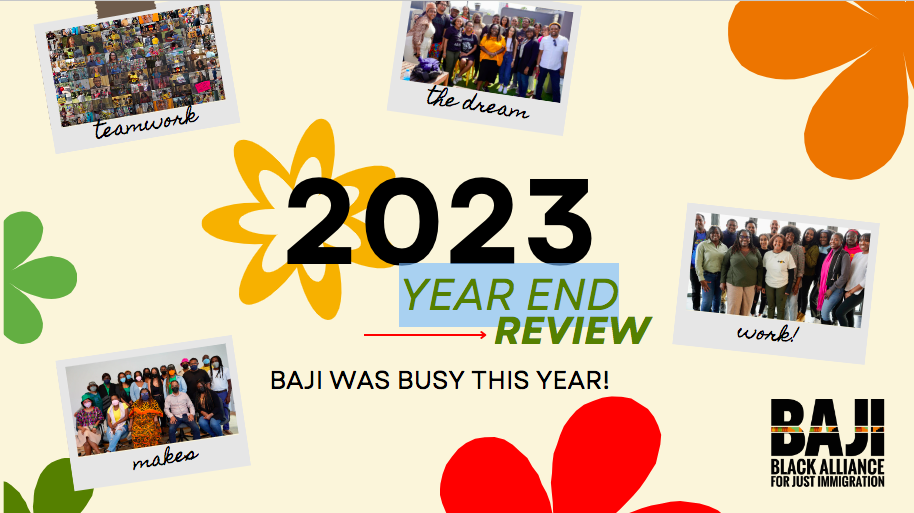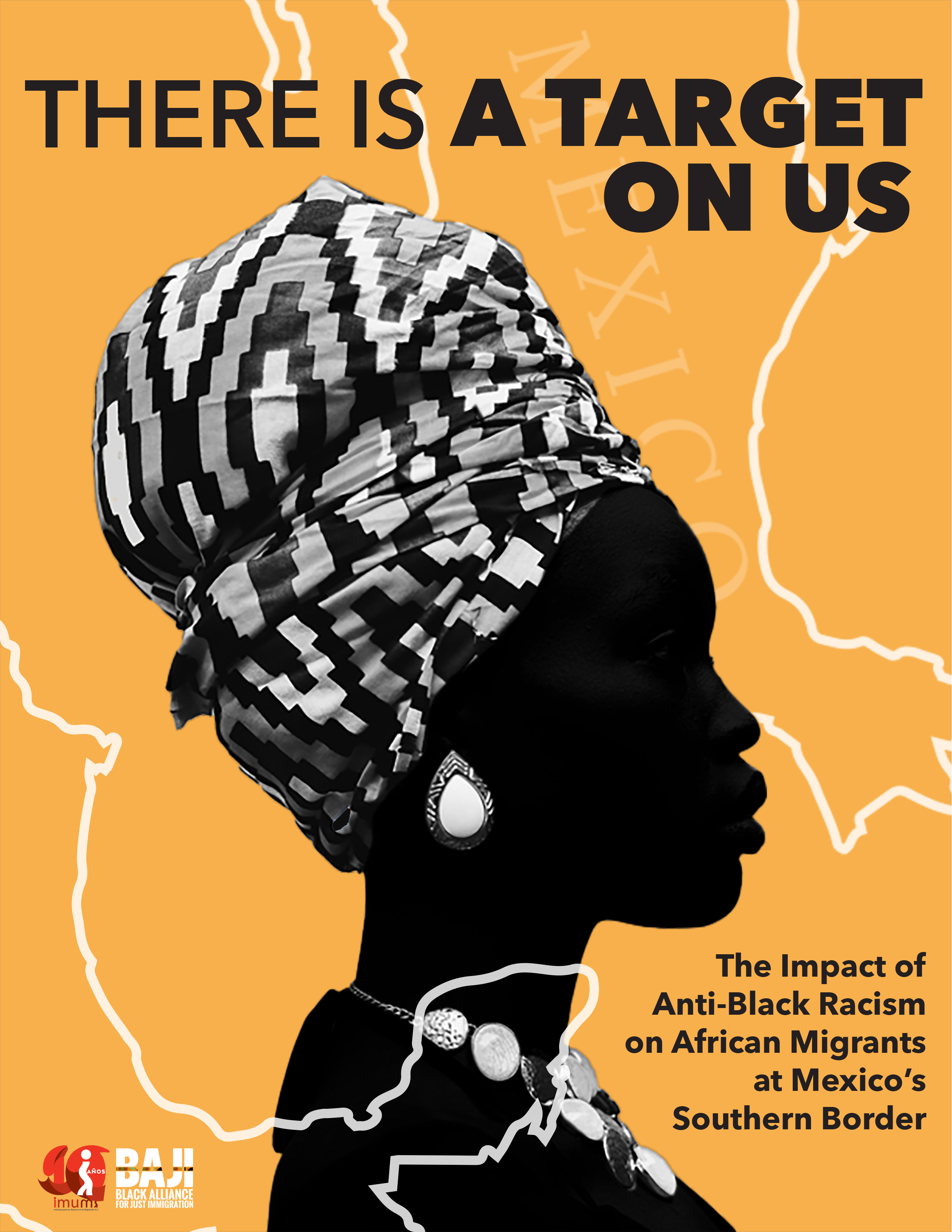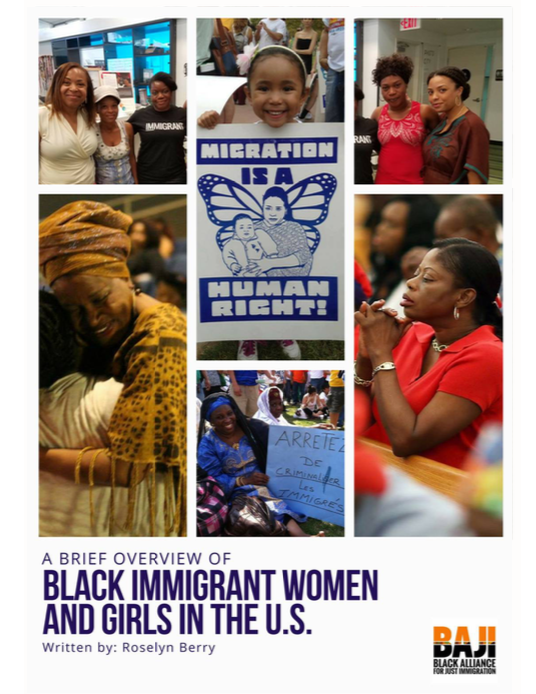+
who
we are
+
find
resources
+
request
help
+
contact
us
+
ways
to give
about baji
BAJI educates and engages African American and black immigrant communities to organize and advocate for racial, social and economic justice. Local BAJI Organizing Committees in New York, Georgia, California and Florida with staff in Texas and Minnesota, build coalitions and initiate campaigns among communities to push for racial justice. At the local and regional level, BAJI provides training and technical assistance to partner organizations to develop leadership skills, works with faith communities to harness their prophetic voice, and initiates vibrant dialogues with African Americans and black immigrants to discover more about race, our diverse identities, racism, migration and globalization.
highlights of BAJI’s work in 2023
mexico is hell for black migrants
Thousands of Black migrants seeking asylum face anti Blackness in Tapachula, Mexico. The US has extended its borders to south and central America by enforcing policies that trap Black Migrants in horrific conditions as they attempt to journey to the US.
baji at 15
resources
BAJI has a number of resources, including published reports, community resource guides, and resources in multiple languages. You may view all resources by clicking the button below, or view resources for specific languages by clicking each respective button, also below.
news & updates
Click to drop down and read, "Letter to Biden on SOTU 2022"
February 28th, 2022
President Biden,
MAKE GOOD ON YOUR COMMITMENT TO RACIAL EQUITY IN YOUR 2022 STATE OF THE UNION ADDRESS
As you give this year’s State of the Union, we look forward to you highlighting legislative wins like the American Rescue Plan or the $1.2 trillion bipartisan infrastructure law. However, we would be remiss not to remind you of all the many promises you made to the Black Diaspora, from voting rights to a humane immigration policy and a dying Build Back Better agenda which, at this moment, has no straightforward path to relief in sight.
Mr. President, it is essential that you use the platform of this speech to recommit your efforts to actualize racial justice-informed policies that support African-Americans and Black migrants. You have called for Russia to end the war in Europe, and we expect you will continue. We ask that you expand your distaste for war and end US-backed wars and conflicts around the world that are a central root cause of migration from Africa and the Middle East. We ask for the same compassion for Black and brown refugees and asylum seekers being shown to other refugees. As you have demonstrated, the US has the capacity to welcome large numbers of people seeking refuge, you cannot leave thousands of Black and brown asylum-seekers languishing at the US southern border.
We will be looking for a speech that details how you will improve the Black migrant experience and pass much-needed racial justice legislation like voting rights, through a stalled Congress, using your executive powers when that is not possible. Demonstrating this commitment to racial justice and immigrant rights is not just the right thing to do but is also politically savvy. As quoted in the New York Times, “Polls show that the vast majority of Americans believe we are on the wrong track, and people will have little patience for lavish claims of progress that defy their lived experiences.” That is why we will be looking for concrete steps towards fulfilling your promises to Black and brown people to close the racial wealth gap, tackle racial inequity in the education system, address environmental justice, and make the right to vote easily accessible for all Black Americans. We will also look for you to address our demands to revoke racist policies like the Migration Protection Protocols and Title 42, both of which you promised Black migrants when you were elected, you would end.
This speech will fail if it does not grapple with the fact that your administration has determined it is more of a priority to appease moderate party members and continue expanding Trump-era policies that directly harm Black migrants than to bring racial equity to immigration policy. Furthermore, the reinstatement of the “Remain in Mexico” policy and the continued unjust use of Title 42 causes devastating harm to already vulnerable migrants and asylum seekers. It blocks them from entering the U.S, most drastically the Haitian migrant community who have come here in hopes of seeking refuge after natural disasters and political turmoil ravaged their homes. They face the brunt of these inhumane policies.
The State of the Union should be bold and uncompromising to the extent it explains how your administration will do better to deliver on its campaign promises. Black migrants have benefited very little from your policies at the one-year mark, and what looks doable usually has harmful pills like the “criminal carve-out” attached to the Build Back Better bill, which would exclude predominantly Black migrants who have been criminalized from receiving relief. The protection and support of Black migrants have not been a priority for this administration, even while we have been on the frontlines and are the essential workers this country relied on to get through this pandemic.
In total, we hope this administration is preparing a State of the Union address that honors your campaign promises to Black migrants by delivering a message on how you will address your failed promises and reverse your harmful policies; because we all know that a crucial midterm election is coming up and you will again come to our communities of color for support – but what will you be able to show for it? If you’re going to honor the promises you made, it starts with coming up with a more inclusive, unified approach to all our issues and not trying to silo them because they impact us all.
We hope to see this vision outlined in the upcoming State of the Union.
Ronald Claude,
Director of Policy & Advocacy
Black Alliance for Just Immigration
Click to drop down and read, "Until We’re Free: Open Letter to President Biden"
President Joseph R. Biden, Jr.
The White House
1600 Pennsylvania Avenue NW
Washington, DC 20500
Vice President Kamala D. Harris
The White House
1600 Pennsylvania Avenue NW
Washington, DC 20500
The Honorable Anthony Blinken
Secretary, Department of State
2201 C Street NW
Washington, DC 20037
The Honorable Alejandro Mayorkas
Secretary, Department of Homeland Security
301 7th Street SW
Washington, DC 20024
Dear President Biden, Vice President Harris, Secretary Mayorkas and Secretary Blinken:
In the wake of the federal recognition of Juneteenth as a holiday, deep racial injustices continue to plague the nation and we await action. Black immigrants continue to face heightened detention and deportation under current policies. Federal immigration legislation introduced and under consideration perpetuates anti-Blackness in our immigration system by prioritizing the policing and criminalization of Black people. Consistent with this administration’s stated commitment to racial equity, it must act by establishing immigration policies that focus on repairing the damage inflicted on Black people, including Black migrants, by eliminating those policies that criminalize, exclude, and separate Black migrants from communities and by instituting policies that are anti-racist and humane.
The Black Alliance for Just Immigration (BAJI) is a racial justice and migrant rights organization which engages in education, advocacy, and cross-cultural alliance-building in order to strengthen a national movement to end racism, criminalization, and economic disenfranchisement in Black immigrant, refugee and African American communities.
We are writing today as we launch the Until We’re Free coalition to urge you to pursue restorative immigration policies that are rooted in human rights and human dignity. A foundational element of immigration policy is its grounding in the experience of Black immigrants. The Until We’re Free coalition will chart a new course for racial and immigrant justice in this country centered on the critical needs and demands of Black people regardless of their citizenship or their interactions with the criminal legal system.
Specifically, we call for the following actions:
- Reforms to the Bond System:
For many immigrants, payment of immigration bonds is the only means to freedom from the harms of detention and family separation. Unfortunately, like most other aspects of the U.S. immigration system, bond practices and policies present insurmountable challenges for those impacted by detention and their families. Immigration bond amounts average around $7500 in most years. However, in recent months Brooklyn Community Bail Fund, the largest immigration bond fund in the country, has posted an average of $12,000 per individual for bond and has received referrals for bonds upwards of $50,000 in recent weeks- a steep cost for freedom. Black people face higher bonds than other detained migrants and most are incarcerated indefinitely in ICE detention. Refugee and Immigrant Center for Education and Legal Services (RAICES), who also operates an immigration bond fund, reports that bond amounts for Black immigrants were 54% higher than those for non-Black immigrants between June 2018 and June 2020. Moreover, studies have shown that the vast majority of immigrants when released from custody continue to appear in court, undermining the need for bond.The administration should engage in rulemaking that at a minimum requires immigration judges to adhere to a “presumption of release” without conditions in all cases; work with Congress to repeal 8 U.S. Code §1226, which sets the minimum bond amount at $1500; establish guidelines to cap immigration bond amounts; and direct the DOJ to issue a bond schedule offering clear guidelines for immigration judges where setting bond amounts.
- Address the Unique Crisis Facing Black Migrants at the Border
U.S. foreign policies- including the failed wars on terror and drugs, and the prior administration’s trade war- have exacerbated tenuous conditions abroad, spurring Black migration across the globe. Over the past decade, as the humanitarian crisis at the border between Mexico and the U.S. deepened, we have seen a growing number of Black immigrants approaching the U.S. southern border to seek asylum. As BAJI, NYU Law School, and IMUMI have shown in our report, There Is A Target On Us: The Impact of Anti-Black Racism on African Migrants at Mexico’s Southern Border, Black migrants seeking asylum experience dangerous, even deadly, anti-Black discrimination, violence, and harm at the hands of Mexican police and civilians. We call on the administration to immediately grant humanitarian parole to Black, LGBTQ+, and other vulnerable asylum seekers at the U.S.-Mexico border.People should never be penalized for the mere act of crossing the border. And, while there have been several steps taken by the administration to reform the asylum system, anti-Blackness and racism remain embedded and unabated. Indeed, laws that criminalize entry and reentry (Sections 1325 and 1326 of Title 8 of the U.S. Code) were explicitly rooted in xenophobia, racism, and white supremacy.
We urge the administration to use its authority to stop criminalizing migration by ending the referral and prosecution of cases under these codes. The administration must go further to turn the page on xenophobia and racism by rescinding the Center for Disease Control Title 42 order as it applies to immigration and an unlawful justification for disproportionate expulsion of Black immigrants, while rescinding its own harmful policies against asylum-seeking families, including its “rocket docket” policy, which will rush asylum cases through court with no legal counsel and subject mostly Black and brown immigrants to mass surveillance.
- Establish a Meaningful Opportunity to Return Home for Those Unjustly Deported
The very history of our immigration system is rooted in a legacy of racism and oppression that has long privileged white immigrants. In fact, our immigration laws have always been used to exclude and target immigrants of color. Our immigration system has detained and deported hundreds of thousands of individuals, separating them from families and communities. For decades, over-policing and racist police practices have put Black and brown immigrants on a pipeline from arrest to deportation that permanently tear parents from their children as a second, and lifelong, penalty. Under the Trump administration, over 400 anti-immigrant executive actions were issued in an effort to deport as many of the 10 million undocumented immigrants living in the U.S. as possible while shutting out refugees and asylum seekers. Many were deported unjustly- despite having strong legal grounds for remaining in the U.S. or being targeted by the federal government. For example, in October 2020, under the Trump administration, over 100 Cameroonian and Congolese asylum seekers were deported. Again, in November 2020, despite Congressional intervention and mass lobbying from national organizations, another 37 Cameroonians, six Angolans and three Congolese asylum-seekers were deported and flown – shackled – back to their respective countries despite awareness that these countries are in the middle of violent conflicts. The Biden administration has promised to turn the page on previous administrations’ racist immigration agenda. It should, therefore, ensure that people who were unjustly deported have a meaningful chance to return to their homes and families in the U.S. - Address the Criminal Legal to Immigration Pipeline
Violence and racism pervade the policing and court systems. Black immigrants are disproportionately stopped, searched, arrested, and killed by the police. Like all Black people in America, Black immigrants are also over-represented from arrest rates to sentencing. 76 % of Black Immigrants are deported because of contact with the police. For fifteen years, advocates have been raising the alarm on the criminal bars enshrined in the 1996 immigration laws that center the role of the carceral state that effortlessly separates, excludes, and expels Black people from communities.The administration’s current interim enforcement priorities perpetuate this pipeline and the systemic racism that pervades both systems. DHS should abandon categorical bars to receiving favorable prosecutorial discretion and the identification of groups of immigrants as “priorities” for enforcement. Barring people from relief based on criminal convictions imports the racism and biases endemic to the criminal legal system and perpetuates them further. The categories that ICE identified in its interim February 18 memo are especially harmful. These categories routinely rely on racial profiling and systematically harm Black and Brown youth especially.
As ICE itself recognizes in its May 27 guidance to OPLA attorneys, the agency’s mission is not to maximize the number of deportations whatever the cost; rather, “the government wins when justice is done.” Justice in the context of prosecutorial discretion means reckoning with the dehumanizing effects of our criminal and immigration legal systems, not continuing them.
DHS and ICE must flip the script on enforcement, prioritizing people for protection, not deportation, or the fundamental problem will remain. Indeed, and unacceptably, detention numbers are rising, as is the anguish of families left behind by the current approach to enforcement. Detention and deportation are extreme consequences, which traumatize entire communities. Each of the people ICE deports has a family, a community, a history, and a life that cannot be reduced to their contact with the criminal legal system. As DHS considers the next iteration of its guidance, the agency must leave behind the “enforcement priorities” framework and instead designate categories of people for protection from enforcement. DHS must treat people as people, not targets.
- Include Immigrants in Criminal Justice Reforms
Immigration is a racial justice issue. Immigrants, especially Black and brown immigrants, feel the double oppression that comes from over-policing by traditional law enforcement, and also immigration enforcement. The stakes are high: an immigrant of color who is racially profiled and criminalized by the criminal legal system is often fed into the detention and deportation machinery. Indeed, Black immigrants make up only 5.4% of the undocumented population in the United States, but make up 20.3% of immigrants facing removal on the basis of a criminal conviction. Criminal justice reform efforts in the past perpetuated this pipeline and in failing to consider immigration consequences, continued incarceration, deportation, and the explosion of ICE detention.In advancing reforms to the criminal legal system, the administration must consider immigration consequences with a particular focus on racial equity. We urge President Biden to use his clemency and pardon powers by pardoning immigrants with deportable convictions and to ensure that those who receive clemency also receive an exercise of discretion, as well as allow people residing outside of the U.S. to seek pardons. Criminal justice and drug reforms efforts must not exclude immigrants; this includes ensuring that any pre- or post-plea dispositions do not count as “convictions” in immigration court. If the administration wants to truly address the legacy of racism and white supremacy in this country, it must commit to addressing racial justice, immigrant justice, and criminal justice together as part of the same fight.
- Fix the Child Citizenship Act of 2000
Congress failed to make the Child Citizenship Act (CCA) of 2000 retroactive, leaving Black immigrants subjected to a now obsolete 1940 immigration law. The Guyer Rule, rooted in racism, prevented the children of unmarried parents from gaining citizenship through their fathers. CCA rescinds the racial discriminatory Guyer Rule; however, many Black immigrants who have resided in the U.S. since before 2001 and would otherwise be recognized as U.S. citizens are not simply because of the accident of their date of entry.The administration should refrain from enforcement against anyone who would be a U.S. citizen under the CCA of 2000 and should call on Congress to immediately fix the law to make it retroactive.
1. Boldy Support Legalization Legislation for the Undocumented that Does Not Leave Those Involved in the Criminal Legal System Behind
This President has in front of him the opportunity to sign legislation that will provide permanent lawful protections for millions of undocumented immigrants who have lived in uncertainty for too long. The moral imperative that brought us to this moment will be compromised if an enacted legalization program leaves behind the very same communities enduring the destabilizing impacts of racist police systems and mass incarceration. Recent legislative proposals for legalization programs, including the Dream and Promise Act and the Farmworker Modernization Act, include expansive bars to legalization, layering newly defined exclusions on top of the already painfully expansive existing grounds of inadmissibility. The Dream and Promise Act also includes a process described as “secondary review,” which would give the government the authority to deny individuals on the basis of a juvenile delinquency adjudication or allegations of gang affiliation never previously considered by a criminal court.
Imposing bars based on criminal convictions or alleged conduct imports the inherent bias and structural racism of the criminal legal system into a new legalization program. As discussed above, Black and brown communities are far more frequently targeted for arrest and prosecution; perverse plea incentives often drive innocent defendants to plead guilty; and harsh sentencing structures disparately harm communities of color. When criminal convictions serve as bars to legalization, these pathologies inherent in the criminal legal system are grafted onto the new legalization system and are directly at odds with widely supported criminal justice reforms.
The administration should call on congressional leadership to ensure that a bold and inclusive legalization program is passed through reconciliation, without exclusions based on past criminal convictions or alleged conduct. At the very least, the President should insist that any new legalization program not layer additional exclusions on top of the grounds of inadmissibility already included in the Immigration and Nationality Act, and that a waiver is available for any ground of exclusion on humanitarian or family unity grounds.
**
The Until We’re Free coalition was formed because it is time to rethink the archaic criminal provisions frequently included in federal immigration legislation and instead focus on modern community-led, transformative solutions that improve our lives and communities. It is time that our immigration laws are free from anti-Blackness and that immigration is centered as a racial justice issue. We urge you to take action to support your stated commitment to addressing the legacies of racism and white supremacy in this country by supporting these transformative changes and using your power to chart a new course for racial and immigrant justice in this country.
Sincerely,
Nana Gyamfi
Executive Director, BAJI
Signed in solidarity by the following immigrant and civil rights organizations and leaders :
Advancement Project | National Office, Alianza Americas, Black Immigrant Collective (BIC), Brooklyn Community Bail Fund (BCBF), Center for Constitutional Rights (CCR), Immigrant Justice Corps (IJC), National Immigration Project of the National Lawyers Guild (NIP-NIG), Progressive Leadership Alliance of Nevada (PLAN), and VERA Institute, Heidi Altman, Jojo Annobil, Judith Browne Diallis, Iman Boukadoum, Oscar Chacon, Carl Hamad-Lipscombe, Mustafa Jumale, Laura Martin, Kica Matos, Brenda Pinero, Sirine Shebaya, Samah Sisay, and Vince Warren.
for foundations
As a nonprofit organization, BAJI relies on contributions from foundations, organizations and individuals. We do critical work at the intersection of immigration justice and anti-black social structures. Supporting Black immigrants and African Americans cannot be undervalued in today’s political climate. Makea donation below to support us in advocating for racial, social, and economic justice.
get involved
Are you interested in getting involved in the work that BAJI does? As an active organization, we have multiple ways in which you can lend your support for Black immigrants. Click a button on the right to engage with our work.
BETTER, BOLDER, BADDER, BAJI






